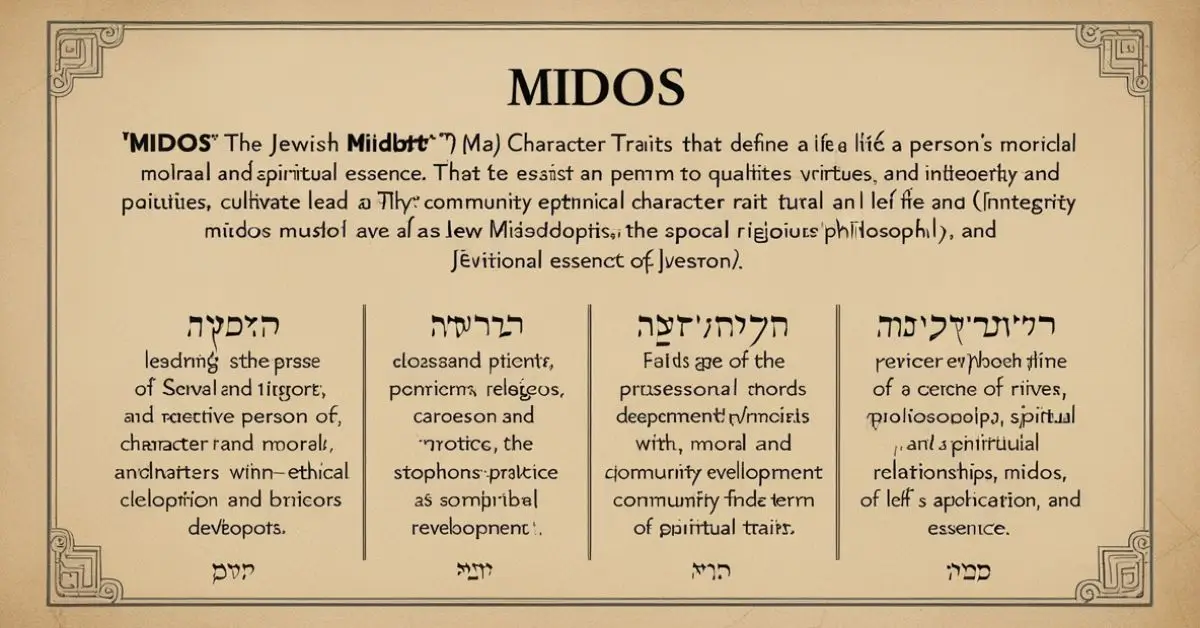The term “midos” (or “middot” in Hebrew) encompasses the ethical character traits that define a person’s moral and spiritual essence. Originating in Jewish philosophy, midos refers to the virtues and qualities one must cultivate to lead a life of integrity and compassion. However, the application of midos extends beyond religious practices, finding relevance in various aspects of modern life, including personal development, professional relationships, and community building.
Understanding the Concept of Midos
At its core, midos represents a framework for ethical behavior and self-improvement. In Judaism, it is believed that one’s character traits, or midos, are just as important as ritual observances. They serve as the foundation for a meaningful and fulfilling life. While the term has spiritual roots, its principles are universally applicable, emphasizing virtues such as kindness, humility, patience, and honesty.
Key Midos Traits and Their Significance
Midos encourages individuals to nurture positive traits and address negative ones. Below are some core midos and their importance in daily life:
1. Kindness (Chesed)
- Definition: The ability to show compassion and goodwill toward others.
- Importance: Kindness strengthens relationships, builds trust, and creates a supportive community. Simple acts of generosity, such as helping a neighbor or volunteering, exemplify this trait.
2. Humility (Anavah)
- Definition: Acknowledging one’s strengths and limitations while respecting others’ contributions.
- Importance: Humility fosters mutual respect and reduces conflict. It encourages people to see themselves as part of a larger whole rather than focusing solely on personal achievements.
3. Patience (Savlanut)
- Definition: The ability to endure delays or challenges without frustration.
- Importance: Patience is crucial for maintaining composure and making thoughtful decisions, especially in stressful situations.
4. Truthfulness (Emet)
- Definition: Upholding honesty and integrity in actions and words.
- Importance: Truthfulness builds credibility and fosters deeper connections in both personal and professional relationships.
5. Gratitude (Hakarat HaTov)
- Definition: Recognizing and appreciating the good in life.
- Importance: Gratitude enhances emotional well-being and promotes a positive outlook on life.
How to Cultivate Positive Midos
Developing midos is an ongoing journey that requires intentional effort and self-reflection. Here are some practical steps to help cultivate these traits:
1. Daily Reflection
- Set aside time each day to evaluate your actions and interactions. Ask questions like:
- Did I act with kindness today?
- How could I have been more patient in challenging situations?
- This practice encourages mindfulness and helps identify areas for improvement.
2. Seek Feedback
- Invite trusted friends, family, or mentors to share their observations about your behavior. Constructive feedback can provide valuable insights into traits that need attention.
3. Learn from Role Models
- Study the lives of individuals known for their strong character traits. Whether through biographies, community leaders, or spiritual guides, observing others’ actions can inspire personal growth.
4. Set Goals
- Focus on specific traits to improve over time. For example:
- If patience is a challenge, practice waiting calmly during minor delays, like in traffic or long queues.
- For humility, try acknowledging others’ contributions more frequently.
5. Engage in Community Service
- Volunteering or participating in community activities fosters traits like kindness, empathy, and cooperation. These experiences often provide opportunities to practice positive midos in real-world settings.
Midos in Modern Life
Midos has profound implications in various aspects of life, influencing not only personal growth but also professional and societal dynamics.
1. Personal Development
Midos serves as a guide for becoming a better version of oneself. Traits like gratitude and truthfulness improve emotional resilience and help cultivate a balanced, fulfilling life.
2. Professional Relationships
In the workplace, midos such as integrity, accountability, and teamwork are essential for building a positive and productive environment. Employees with strong midos are often more reliable, approachable, and effective leaders.
3. Community Impact
On a societal level, practicing midos creates a ripple effect. Acts of kindness and ethical behavior inspire others, fostering communities rooted in trust and mutual support.
4. Conflict Resolution
Midos like patience and humility play a critical role in resolving conflicts. They encourage empathetic listening and compromise, helping to de-escalate tensions and find solutions.
Midos vs. Modern Self-Help Principles
While midos has its origins in ancient philosophy, its principles align closely with modern self-help and psychological practices. Below is a comparison of midos traits and their contemporary counterparts:
| Midos Trait | Modern Parallel | Key Similarities |
|---|---|---|
| Kindness (Chesed) | Emotional Intelligence | Promotes empathy and understanding |
| Humility (Anavah) | Growth Mindset | Encourages learning and collaboration |
| Patience (Savlanut) | Stress Management | Helps maintain composure in challenging times |
| Truthfulness (Emet) | Authentic Leadership | Builds trust and credibility |
| Gratitude (Hakarat HaTov) | Positive Psychology | Enhances happiness and overall well-being |
Challenges in Cultivating Midos
Despite its benefits, developing midos can be challenging. Factors such as stress, societal pressures, and ingrained habits may hinder progress. Overcoming these obstacles requires persistence, self-awareness, and the willingness to seek help when needed.
Common Challenges:
- Impatience: Modern life’s fast pace can make patience difficult to practice.
- Ego: Pride and fear of vulnerability may hinder humility and truthfulness.
- Negativity Bias: The tendency to focus on negative experiences can impede gratitude.
Strategies to Overcome Challenges:
- Practice mindfulness to remain present in stressful moments.
- Reframe negative situations by focusing on potential learning opportunities.
- Surround yourself with positive influences that encourage good midos.
Midos: A Lifelong Journey
Refining one’s midos is not a task with an endpoint. It requires consistent effort and adaptability as life circumstances evolve. This process is deeply personal, allowing individuals to grow at their own pace while contributing to a more compassionate and ethical society.
Conclusion
Midos represents a timeless guide to ethical living, emphasizing the virtues that shape character and relationships. By nurturing positive traits like kindness, humility, and patience, individuals can achieve personal growth and positively influence those around them. As the world becomes increasingly interconnected, the principles of midos remain more relevant than ever, offering a blueprint for building meaningful connections and a harmonious society.











